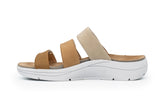Decoding Morton's Neuroma: Recognizing Signs and Exploring Treatment Options
Morton's Neuroma, characterized by a thickened mass of tissue that compresses nerve tissue, is a chronic foot condition that commonly affects the area between the third and fourth toes. Individuals engaged in activities such as wearing high heels or participating in high-impact sports may be more susceptible to this condition. Recognizing the signs of Morton's Neuroma is crucial for timely diagnosis and effective treatment.
Common Signs of Morton's Neuroma:
- Pain: The primary symptom of Morton's Neuroma is pain, often accompanied by a burning sensation. The pain is typically located between the third and fourth toes, exacerbated during walking or weight-bearing activities.
- Tingling and Numbness: Morton's Neuroma may cause tingling and numbness on the ball of the foot, contributing to the complexity of the pain experience.
- Burning Sensations: Persistent burning sensations can be a hallmark sign of Morton's Neuroma, often associated with pinched nerves.
- Swelling: The compression of nerves by thickened tissues can lead to swelling, particularly in the affected area between the toes.
- Marble-in-the-Shoe Sensation: A unique symptom is the feeling of having a pebble or marble in the shoe, even when walking barefoot, indicative of Morton's Neuroma.
Seeking Diagnosis and Treatment:
Early detection is crucial to avoiding more invasive interventions. A comprehensive diagnosis involves a thorough examination, symptom review, and diagnostic imaging such as X-rays. Treatment options for Morton's Neuroma may include:
- Footwear Modification: Choosing did with a wide toe box and a flat heel can alleviate pressure on the affected area.
- Steroid Injections: Injections may be administered to reduce inflammation and provide relief.
- Physical Therapy: Targeted exercises can help improve foot function and alleviate symptoms.
- Orthotics: Custom orthotic devices may be recommended to provide additional support and reduce pressure on the affected nerves.
- Anti-Inflammatory Medication: Medications may be prescribed to manage inflammation and alleviate pain.
- Decompression Surgery: In severe cases, surgical intervention may be considered to relieve pressure on the affected nerve.
In addition to these treatments, self-care measures such as massaging the feet and applying cold compresses can offer additional relief. Choosing footwear wisely and being proactive about symptom management are integral components of a comprehensive approach to Morton's Neuroma.
Check out our extensive collection of shoes for arthritis to find the best shoes for your feet.
Look through our most-sought-after styles to get the right pair for you today with DiabeticShoe.in.








